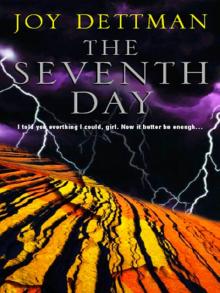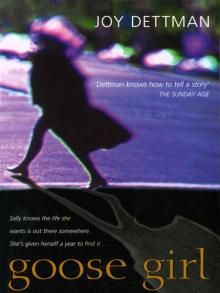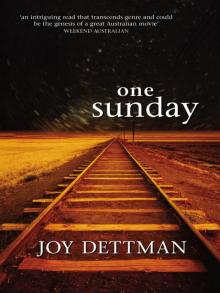- Home
- Joy Dettman
The Hope Flower Page 4
The Hope Flower Read online
Page 4
She shook her mind back to the moment when she heard Mick coming. You couldn’t mistake his leg-throwing, step-clunk walk.
‘We have to do it, Lori. She needs some sort of treatment,’ he said.
‘As if she’d go willingly, and as if it would do her any long-term good.’
‘They cart Kevin Frazer away when he goes off his head.’
‘Which he’s been doing once or twice a year since I’ve known about him. They can’t fix him permanently. And you know as well as me that the minute they cart Mavis away, this place will be swarming again with outsiders – and the least they’ll do is take Matty – and if Mavis gets near a psych, she’ll tell him how we held her prisoner and she’ll have the cops arresting Martin for stealing her pension.’
‘Then what do we do?’
‘Nothing, or nothing until after Vinnie’s birthday. Once he turns eighteen, I promise I’ll go along with . . . with whatever.’
Neil came from the shadows. For how long he’d been listening, Lori didn’t know, maybe not for long. He had news. ‘Eddy just sent Mr Watts an email about getting one of those shower things,’ he said.
‘Cubicles,’ Lori said. Eddy had been emailing Watts about paying for a shower cubicle for months, and every time he received the same reply. Watts had total control of Eva’s money and would probably embezzle the lot before the twins turned twenty-one.
‘We’ve got enough in the emergency fund to buy one,’ Mick said.
They did. It had ballooned since Watts, instead of Centrelink, had started paying for the twins’ support. The day his payments landed in Mavis’s account, Lori and Mick transferred them electronically to the emergency fund – which Lori had no intention of wasting on a shower cubicle.
‘We’d have to pay a plumber to install it, and get permission from the council to drain its water into the sewer, and the council would find out that no one was given permission to connect up our second loo –’
The Willama council was Lori’s archenemy. Since they’d built that levee, the blocks down the bottom end of Johnson and Dawson streets, which were twice the size of normal house blocks and no longer flood prone, had become prime real estate. Nelly swore that the mayor was taking kickbacks from developers. Every year the rate bills increased, and they charged almost as much for the vacant block as they did for the house.
Lori hadn’t known there’d been such things as council rates until after Henry died. She used to think that if a person owned their own house, they didn’t have to pay anything to anyone to live in it, and that they could do what they liked to it. She’d learnt too much too fast during those first months of no Henry.
‘Bert will help me install it. We can drain the water out to the block,’ Mick said.
‘That emergency fund is our safety net,’ Lori said.
Trapeze artists could be fearless because they knew that a net was stretched out beneath to catch them if they fell. Having lived for months with no access to money, having picked mouse dirt out of rice so she’d had something to feed the kids, she’d vowed it would never happen again.
Mick went inside. She didn’t. She walked east down the footpath, then cut through long dry grass to Henry’s potting shed cum greenhouse, the only place now where she could still feel his presence. He’d never really existed in the house – was just a shape, a disappointed little shadow man, wandering around and between his umpteen kids with a mop or a broom in his hands. He’d existed in his shed.
He’d loved flowers, not the tough type that would survive out of doors, but exotic things that lived in pots and required shelter. She’d never counted his pots, but he’d accrued shelves of them, tiers of them he’d somehow kept safe from Mavis. He used to sing to his flowers some nights, not modern songs but the old ones with lyrics that told sad stories. On his singing nights, he’d have an audience of neighbours, leaning on their gates or sitting on their verandas, listening to a free concert. Lori had always claimed the best seat in the house. She used to creep in and sit down in the shed. Closed in with his voice he’d sounded as good as those three tenors who were paid millions to sing for the Queen of England.
When he’d lived in London, he’d been in stage musicals, which Lori had known nothing about until after Eva’s funeral. He used to talk nonstop some days about his wonderful life in London, about his wonderful parents, but not once had he mentioned those musicals, as he’d never mentioned living in Melbourne for five years. They’d found out a lot from one of the albums Eddy brought home, such as an advertisement for Camelot with Henry’s name listed as Sir Lancelot.
He’d killed himself. Three years ago. Hung himself, not in his potting shed with his flowers but in the chook pen. Chooks had never mattered to him, only their eggs. His flowers had mattered.
A few of his plants died with him. Half of his bonsais had, but not his orchids. They’d looked like weeds until that first winter of no Henry, then out of each clump of weeds, spikes had started shooting up like . . . like messages from Henry. They’d turned into the most spectacular bunches of flowers anyone had ever seen.
Lori and Alan had saved eight of the bonsais by removing them from their stupid little pots, untangling their roots and the copper wire Henry had used to turn them into grotesque caricatures of trees, then they’d planted them where the front fence posts used to be, and not one of those eight had died. Two had almost doubled in size, and sooner or later, the others might find confidence enough to start growing, once their roots realised that Henry wasn’t going to come along with his scissors and snip them off again.
improvements
‘I did it,’ Eddy said on Saturday night.
‘You did what?’
‘Watts,’ he said. ‘He’s agreed to pay for a shower.’
‘True?’
‘Read his email.’
Everyone read it while Eddy sat back preening. It wasn’t good for him, only more proof that he could have whatever he wanted, which was Eva’s fault. They allowed him to preen that night.
Watts’s reply was brief. All he’d said was that an employee from a local bathroom company would arrive at four o’clock on Tuesday. Four o’clock was good. It meant that no one would need to miss school.
They rode home fast that day, watched Eddy make Mavis a mocha coffee, then stood fingers crossed until she drank it. Had Lori offered that coffee, Mavis would have smelt a rat, but rat-cunning Eddy made her coffees at odd times and only medicated them when absolutely necessary.
She was snoring on her recliner, her television playing, when the bathroom dude arrived. He stayed long enough to draw up a rough plan of their bathroom, to take a few measurements, to eye their stained bathtub, pull back the shower curtain and attempt to turn off the shower’s drip, then he left, with Eddy’s phone number and email address.
They waited through Wednesday, waited through Thursday and Friday, then on Saturday morning Watts phoned. He wasn’t going to buy them a shower cubicle. He was going to buy them a new bathroom.
That company must have needed work. Two men arrived before eight on Monday. In all, it took four days and for those four days Eddy didn’t go to school. Lori dropped a note off at the office that said he had a virus. He was running low on Xanax pills before the new bathroom was finished – but it looked so good, too ridiculously good to belong in Henry’s house, and Mavis needed no encouragement to give it a test run.
Of course she blamed Martin for it. Of course she claimed that it was her pension that had paid for it. But she came out of their new bathroom smelling of soap and deodorant and wearing the skirt and shirt Lori had chosen for her.
Her language hadn’t been deodorised. They sat through an overdose of ‘the thieving bantam bastard’, Martin, which led to an overdose of ‘the old bitch’, her mother, dead before most of the listeners had been alive. By the time she got onto Eva, ‘that queer bitch’, dinner had been served and Lori’s mind had wandered away to the box full of jewellery Eddy had brought home after the funeral.
; Amongst the earrings and pearls, there had been two identical wedding rings, identical other than in size. The engraving on their inner circles was identical. It said, Forever, E and A. According to Mavis, Eva and old Alice had been in a relationship since Eva started at the high school where Alice used to teach. Also, according to Mavis, Eva had only married Henry to get their father off her back – and because Henry had been too green to wake up to what had continued beneath his nose. He’d been married to Eva for five years.
‘I would have got half of that money if my father had outlived the old bitch,’ Mavis lamented, a well-worn lament, but they nodded and sniffed deodorant while shovelling in stew and vegetables, and if a few minds wandered, who’d blame them.
Lori was still thinking jewellery, thinking of the gold baby bracelets Eddy had brought home. When the twins had lived at home as babies, Henry used to tell them apart by the moles on opposite sides of their backsides. After Eva took charge of them and bought those name-tag bracelets, she’d put them on the wrong wrists. By the time Henry discovered the mix-up, after their heart operations, the twins were five years old, too old to swap their correct names back. They’d been mixed up since.
*
Before school the following morning, they smuggled Nelly in through the front door to show her their bathroom. Then on Sunday, Martin popped in early to see it – and Alan stopped timing his visit after twenty minutes. He stayed for the hour his wife and her parents were at church.
Even Donny came home to see it, came loaded with his usual supermarket bags. He always brought food, out-of-date cans of soup, stew and vegetables, overripe bananas, and that day a box of semi-rotten tomatoes, a plastic-wrapped half cabbage and a bag of elderly apples. They picked out the best of the tomatoes and apples and gave the rest to Nelly to turn into chutney.
Mavis ate two bananas. She tolerated Donny because he never talked back and maybe because of his bananas, this time two kilos of them and not all of them turning black.
He didn’t stay for dinner. It was around six when he left for home, and every kid walked him over the road to his car, a small blue Mazda he was still paying off, a pretty metallic blue too pretty for him – not that he was ugly, just close to it. He’d always been a blotch of freckles and his eyebrows and lashes were almost white, plus he had crooked and rotten front teeth, which made Lori wonder what sort of girl he’d found to move in with him.
He was in his car, the motor running, when he reached into the glove box, removed a lolly-pink mobile phone and its charger and handed them to Lori. ‘It was Lisa’s,’ he said. ‘She bought herself an iPhone.’
‘For me?’
‘I didn’t think that Mick would appreciate pink,’ Donny said. ‘We connected it up to Telstra for you and prepaid it for a month. If you only use it for texting, it shouldn’t cost you more than ten bucks a month.’
‘Jesus,’ she said, disbelieving what she held in her hand. ‘Wow! Like double wow. Tell her thanks very much, Donny, and thank you. Wow.’
What else can you say? Most of the kids at school had mobiles but you get used to not having what most kids have. She’d never given ten seconds of thought to owning her own mobile, had never given one second of thought to it. They cost big money to buy and Eddy’s plan, with unlimited calls and broadband, cost Watts seventy-eight dollars a month.
‘Its battery is next door to useless,’ Donny said. ‘Plug it in at night when you go to bed, or that’s what Lisa did.’
She was still standing there, awestruck, when he started for home. Didn’t follow the boys back to the house but walked around to Nelly’s back door, where she’d be safe to wallow in ecstasy while working out how to use it.
She knew how to use Eddy’s modern mobile. The pink phone wasn’t modern but was similar to the mobile Martin had given to Mick three years ago, for emergencies, which Mavis stole. She’d steal this one too if given half a chance, and start driving Spud Murphy mad again with her midnight phone calls. She’d phoned him so often he’d reported her to the cops, though he’d deserved to be woken up. On nights when the moon was full, his howling dogs kept the entire neighbourhood awake. The Willama taxi drivers had appreciated Mavis’s late calls. She used to phone them to shop for her, to buy her cigarettes and take-away. They’d appreciated her cheques too – until they’d started to bounce.
Nelly remembered. She’d received her fair share of phone abuse. ‘You’ll need to keep it away from her, Smithy.’
‘It won’t leave my pocket,’ Lori said, then tested it by sending a text to Martin.
Add this number to your contacts.
Who are you? he replied.
‘Say a secret admirer,’ Nelly suggested. She was the size of a kid and could be more kid than adult at times, so that’s what Lori texted and they giggled like kids when he replied.
Is that you, Jan?
‘Who’s Jan?’
‘Sean’s sister. He used to like her,’ Lori said, but came clean.
It’s Lori. Donny just gave me Lisa’s old mobile.
He’d heard about Lisa but hadn’t met her. Lori knew nothing about her, other than she was from Melbourne, that she taught at a Catholic primary school and that she’d moved in with Donny in January, moved into his one-bedroom unit, which meant she was sleeping with him.
The mobile spent its first night charging on the dressing table, thirty centimetres from Lori’s head. It spent Wednesday morning at school, turned off and zipped into her uniform pocket with her wallet. She turned it on at lunchtime, just to check its charge, and Leonie saw it and snatched it.
‘When did you get this?’
‘Yesterday. My brother’s girlfriend bought herself an iPhone. Give it back.’
Leonie sent herself a message then sent one to Paul, her brother, like Meet me tonight at eight under the post office clock? Knowing her, she could have sent worse, and was likely to. Lori got it back.
And it buzzed.
Identify yourself and I might?
‘Answer him,’ Leonie urged. ‘He’s still got the hots for you.’
Your stupid sister sent it from my mobile, Lori texted.
He must have been able to see his stupid sister. He and Mick came over to talk. He was Mick’s friend as well as being Leonie’s brother. A year ago, he’d been Lori’s sort of boyfriend – until Wendy Johnson’s stomach had started blowing up.
The first period after lunch was English and Mr Morris wanted their assignments on the play Lori hadn’t read. She’d read the first few pages, read the questions at the back of the book and the bit about the author. Most of what she’d written was about him, not his play.
George Bernard Shaw was a vegetarian/socialist. Had he been alive today he would have been into multiculturalism in a big way. His life story is more interesting than his play. He wrote several unsuccessful plays and if they were as unbelievable as Pygmalion, it is easy to understand why they were unsuccessful.
Pygmalion is about two old men, Higgins and Pickering, who might have been speech therapists if they’d been alive today. They pick up Eliza, who today might have been a dead-beat street kid, but that doesn’t stop them from moving her into their house, with their housekeeper.
Eliza’s speech is unintelligible but Higgins makes a bet with Pickering that after two months of intensive therapy he’ll pass her off as a well-spoken lady . . .
She’d padded it out by using bits of the writer’s dialogue. She’d turned a couple of the book’s questions around to become statements and hoped she’d faked it sufficiently. English was the one subject she usually got reasonable marks for.
Her day was better than reasonable but sort of weird. It was like being the owner of a lolly-pink mobile advertised her as a female. Tim Buchanan, who she’d played football with in primary school, got her number from someone and texted her. Before that day was over, she’d saved nine contacts, not including Donny, Martin, Eddy and Nelly’s.
Then that night, at eight on the dot, her phone buzzed in her pocket. It was
Paul. I’m at the post office. Where are you?
As if I believe you, she replied.
I could be, he texted.
roman holiday
Lori gave up the air conditioner’s fuse on Sunday when the temperature before midday was thirty-nine and last night’s forecast was for it to peak at around forty-one. She gave it to Mick, for Mick, and because Mavis was showering regularly and there was an old movie starting at two that Mavis wanted to watch and because when you live with a nest of fire ants, you do your best not to stir them up.
She, Mick and most of the kids were in the refrigerated lounge room when Roman Holiday began.
‘The last time I saw this was in Henry’s flat in South Yarra,’ Mavis said.
It was rare for her to mention Henry so when she did, the kids’ ears pricked up, even Neil’s. He remembered him. Timmy and Matty didn’t – or Eddy. Henry had been dead before Eddy moved back to Willama.
‘How long did you live in South Yarra, Mave?’ he asked. Eddy always called her Mave, because Eva had called her Mave.
‘A month,’ she said. ‘We were going to stop-over in Rome on our way to London.’
‘You never got there?’ Eddy asked.
‘I was seventeen. I needed the old bitch’s permission to get a passport.’
Even Eddy knew that Mavis’s seventeenth year was a subject to steer well clear of. He asked no more questions.
Roman Holiday might have been an okay movie if not broken into five-minute segments by commercials. Mavis hated commercials, and who could blame her for that.
The movie was half over when Neil, a collector of all information of a sexual nature, wasn’t collecting a lot. Half a hundred years ago, actors weren’t into stripping off and jumping into bed. Anyway, during a commercial, he asked about condoms. ‘Didn’t they have condoms back in those days?’
Eddy was about to give him a history lesson when Mavis hauled off and whacked Neil across the ear.

 The Hope Flower
The Hope Flower Trails in the Dust
Trails in the Dust Diamonds in the Mud and Other Stories
Diamonds in the Mud and Other Stories Moth to the Flame
Moth to the Flame The Tying of Threads
The Tying of Threads Wind in the Wires
Wind in the Wires The Seventh Day
The Seventh Day Thorn on the Rose
Thorn on the Rose Jacaranda Blue
Jacaranda Blue Mallawindy
Mallawindy Ripples on a Pond
Ripples on a Pond Goose Girl
Goose Girl The Silent Inheritance
The Silent Inheritance Henry’s Daughter
Henry’s Daughter Yesterday's Dust
Yesterday's Dust Pearl in a Cage
Pearl in a Cage One Sunday
One Sunday